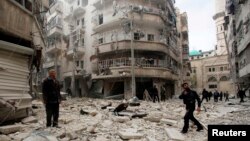A monitoring group said fighting between Islamic State and Palestinian militants, as well as shelling by government forces, caused hundreds of residents of a refugee camp near Damascus to flee early Sunday.
An activist based in an area just south of Damascus said many residents started fleeing the camp after midnight as the fighting let up. The camp has been subjected to intense shelling and airstrikes by the government, according to the United Nations.
Al-Dimashqi and Syrian state TV said as many as 2,000 people have left the camp.
The Britain-based Syrian Observatory for Human Rights said fighters from the Islamic State and al-Nusra Front gained control of about 90 percent of the Yarmouk Palestinian refugee camp. The two groups fought other rebels, including a Syrian-Palestinian militia, which opposes the Syrian government.
The Observatory said the fighting has killed 26 people since the clashes first broke out Wednesday.
Palestinian forces inside Yarmuk are largely surrounded by Islamic State fighters.
Government shelters
Anwar Abdul Hadi, a Palestine Liberation Organization official, said most of those evacuated from the camp were being hosted in government shelters, with at least 25 wounded taken to hospital.
The U.N. agency for Palestinian refugees (UNRWA) said it had on Sunday given "life-saving humanitarian support to 94 civilians, including 43 women and 20 children, who fled Yarmuk."
The U.N. said about 18,000 civilians, including a large number of children, are trapped in Yarmouk, according to the French news agency AFP. The camp has been under government siege for nearly two years, leading to starvation and illnesses caused by lack of medical aid.
Meanwhile, the Syrian government and some opposition figures will start a second round of talks in Moscow Monday, focusing on humanitarian issues, although a broader agreement is unlikely as Syria's main opposition group continues to boycott the talks.
Participants say they do not expect any big breakthrough toward ending a conflict that has killed more than 220,000 people in Syria since early 2011.
January's unproductive first round of consultations in Moscow was shunned by the main political opposition group, the Western-backed Syrian National Coalition. It said it would take part only if the talks were to lead to the departure of Syrian President Bashar al-Assad, an ally of Russia.
The Istanbul-based SNC has said it will also stay away from the second round of talks, due to last until Thursday. Russia said fighting terrorism in Syria should be the top priority now and has called on the opposition to work with Assad to that end.
Randa Kassis, a former SNC member who now favors talking to Damascus because of the rise of radical Islamists in Syria, said the talks would focus on confidence-building measures, including ensuring access for humanitarian aid.
“We won't get to a political transition without slowly giving and taking,” Kassis, who now heads the Movement of Pluralistic Society, told Reuters.
Similar attendees
Moscow has not said which opposition figures will attend. But the line-up is likely to be similar to January, when more than 30 representatives of various groups attended, most from groups tolerated by Assad or who agree that working with Damascus is necessary to combat the rise of the Islamic State group.
The Observatory said Syrian authorities had released 650 prisoners from at least three prisons in Damascus on March 25-27, including women, children, political prisoners and fighters.
A Moscow-based member of moderate Syrian opposition group the National Coordination Committee said that this was not enough, however, and that any attempt by Damascus to tie the release of these people to the talks would be “just an act.”
“We'll see what the government delegation comes up with, including on the humanitarian front, but I am not hopeful for anything special. It'll be more of a continuation of dialog at best,” said the representative, who declined to be named.
Some material for this report came from Reuters, AP and AFP.





